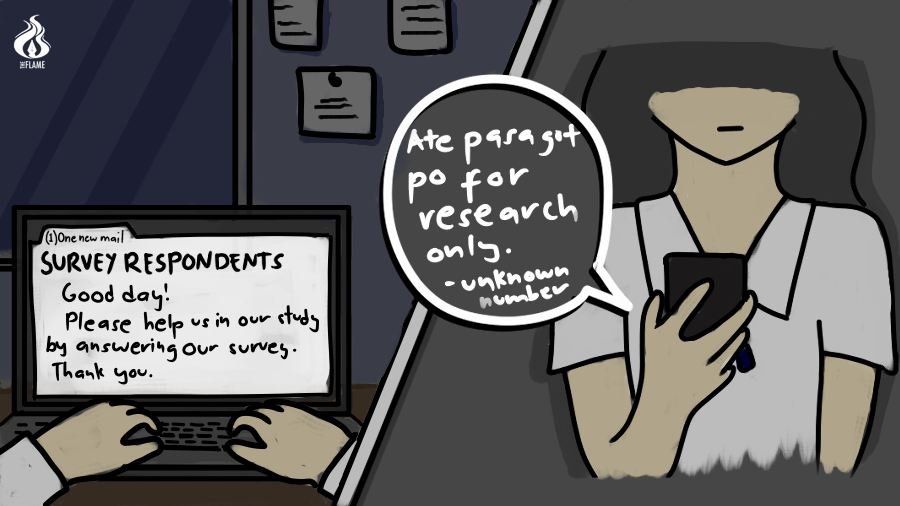
“GREETINGS IN the name of St. Thomas Aquinas! We are fourth year students conducting a study on…”
Thomasians know that it’s already thesis season when they receive requests to answer survey forms in their university email accounts – and such requests usually begin with these sentences or lines hugely similar to them.
The search for respondents is crucial for undergraduate seniors completing their most important academic requirement before graduation. Institutionalized email accounts like the UST Educational Technology Gmail account allow their users to search for the names of anyone affiliated with the organization,
However, this method of gathering data has raised concerns among some students and researchers at a time when people are plagued with spam texts and promotional messages.
Journalism senior Alexandra Donato thinks the method is “unethical” and constitutes an invasion of privacy.
“I never did it (email blast) since it is unethical for me based on my ethical and moral standards… You’re like invading the time of that person and you’re coercing the person to answer your survey,” Donato said.
She recalled instances where researchers offered monetary compensation as a reward for answering their survey.
Donato noted that graduating journalism students have to secure the approval of the dean and the ethics board before they can start the data gathering for their thesis.
Journalism senior Irish Lorraine Perez shares Donato’s sentiments but does not find email blasts harmful. Perez, who has experienced working in human resources management, said students can ignore or treat such invitations as “spam.”
“Most of the time, students don’t always check their emails unless it’s from their professors or related to their academic workloads,” she said.
Invasion of privacy?
UST Research Center for Social Sciences and Education (RCSSED) director Jeremaiah Opiniano said every method that involves the gathering of research participants may raise privacy issues.
He said email surveys are allowed, provided researchers have secured a research ethics approval.
UST Memorandum Order 34, which provided the guidelines for securing research data gathering approval, requires students to secure final approval from the University’s data protection and privacy compliance officers.
Students must present clearance from any accredited UST Ethics Review Committee, review and endorsement of the Office of the Vice-Rector for Research and Innovation, and the approval of the concerned privacy officers.
Opiniano said researchers should secure informal or formal permission from the target respondents before sending online survey requests.
“Sending these emails directly without permission is like you receiving text messages from unknown numbers. Thus, consent matters,” Opiniano, also the coordinator of the journalism department’s thesis program, added.
For Asst. Prof. Ronald Castillo of the UST political science department, email blasts still violate communication ethics even if there is “not so much privacy” in institutional emails.
“We Filipinos used to know this, ‘tamang asal (right attitude),’ polite behavior. Imagine asking someone to spend their time for your research, and you ask them in an impolite manner.” Castillo, a research associate at the RCSSED, said.
Pros and cons
Unlike Donato, political science senior Miguel Sacro views the sending of survey request letters using institutionalized email accounts as an efficient way to reach potential study respondents.
He said its efficiency lies in the fact that an institutionalized email user can gather multiple respondents in a limited amount of time.
“It could be efficient when the study [that the student] is trying to accomplish needs many participants [or] respondents and especially if the time frame for the entire accomplishment of the study is short,” Sacro said.
But Sacro clarified that sending email blasts would only be advantageous if done “properly.”
“It depends on how it will be used. For example, those who are not aware of the email blast may be surprised, particularly if the people who conduct the study are strangers or just acquaintances only,” he said.
Donato thinks otherwise. While she acknowledged that email blasts might be “efficient in terms of quantity,” survey questions are at risk of being answered “nonchalantly” by the respondents.
“A lot of people are going to provide insubstantial answers because they are not going to take the survey seriously. So, I think it’s really inefficient,” she said.
Perez raised the possibility of intended recipients not noticing the email messages.
“There’s no guarantee that they would really go back to your email and respond to your invitation, not unless you resend the email, but then again, that would somehow look like you’re forcing them to participate since the email is directed and addressed to them,” she said.
Donato and Sacro said institutional emails should only be visible to their classmates, professors and thesis advisers to ensure data privacy and protection.
Castillo said some seniors have a misconception about the efficiency of email blasts, adding that the data gathered from this method is “subpar” and “incomplete” for higher education level research.
“True research requires rigor for accuracy of data… Email blasts lessen accuracy and richness of information since personal engagement is removed between the researcher and the resource,” Castillo added.
Alternatives
Perez and Sacro said crowdsourcing in social media and using varied platforms provide opportunities to search for study respondents.
Perez said thesis students can post short videos on Facebook stories or use Instagram reel to persuade potential respondents.
Thesis writers may also invite participants through social media platforms, Sacro said.
Castillo urged Artlets to engage more with their respondents and to practice proper communication ethics in gathering data. He said he gathered data from foreign respondents through strategically written emails, Zoom video meetings, and “properly composed Messenger text.”
Opiniano suggested using more basic approaches in gathering survey respondents, saying leading researchers and publications also do the same. According to him, Filipinos are still hesitant to respond to online surveys and interviews and prefer answering face-to-face surveys and qualitative interviews.
“We also have old-fashioned tools like word of mouth, friendly requests delivered orally or via mobile phone SMS, or even the old-school postal letter or telesurvey,” Opiniano said. F – Axel Aldana



